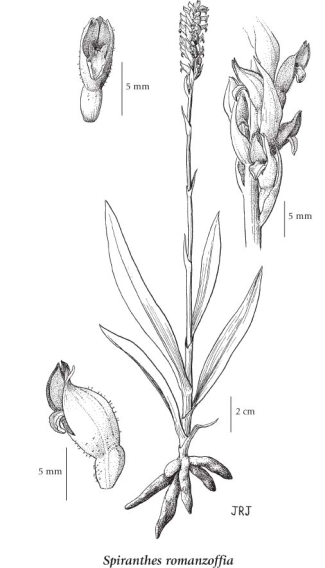Spiranthes romanzoffiana Cham.
hooded ladies' tresses
Orchidaceae (Orchid family)
Introduction to Vascular Plants
hooded ladies' tresses
Orchidaceae (Orchid family)
Introduction to Vascular Plants
Introduction
Hooded ladies' tresses (Spiranthes romanzoffiana) is a widespread species in North America and is found throughout Canada and the United States, except for the southeastern states (USDA 2010). In British Columbia, this species is frequent below 55 degrees N and infrequent north of that. Across the province it is found in a variety of habitats, including dry to moist forests, bog forests, and open (moist) meadows at elevations ranging from sea level (Boundary Bay Park) to 1200+ m. This is a perennial species,10-50 cm tall, with long fleshy tuberous roots. Leaves are primarily basal with some stem leaves that grade into short, sheathing bracts. Flowers are distinctive, white and spiralling on the stem, often in vertical rows.Flowers appear from mid-July to mid-August at low elevations, but plants have been observed in flower in September at higher elevations. This species is very similar to Ute ladies' tresses (Spiranthes diluvialis), a recently found species of ladies' tresses in the province.
|
Species Information
General:
Perennial herb from long, fleshy, tuberous roots, with a few fibrous ones; stems 10-50 cm tall, leafy below, bracted above.
Leaves:
Basal linear to linear-lanceolate, 5-20 cm long, usually 5-10 mm wide, some stem leaves but soon reduced into short, sheathing, lance-shaped bracts above.
Flowers:
Inflorescence a dense, bracted, cylindrical spike, the flowers creamy-white to greenish-white, usually in three somewhat spiralling vertical rows, the bracts 10-20 mm long, about the length of the flowers, whitish or pale green; sepals and petals to 12 mm long, the lateral sepals narrowly egg-shaped, the tips bent back, the upper sepal and petals about equal in length, forming a curved, tubular hood 7-12 mm long; lip egg-shaped, about length of sepals, veined, strongly curved downward, constricted above the middle, widened below into an egg-shaped, terminal lobe; spur absent; column 2-4 mm long.
Fruits:
Capsules, to 10 mm long.
Illustration

If more than one illustration is available for a species (e.g., separate illustrations were provided for two subspecies) then links to the separate images will be provided below. Note that individual subspecies or varietal illustrations are not always available.
Illustration Source: The Illustrated Flora of British Columbia
USDA Species Characteristics
Flower Colour:
White
Blooming Period:
Mid Summer
Fruit/Seed characteristics:
Colour: Brown
Present from Summer to Fall
Source: The USDA
Ecology
Ecological Framework for Spiranthes romanzoffiana
The table below shows the species-specific information calculated from
original data (BEC database) provided by the BC Ministry of Forests and Range.
(Updated August, 2013)
The table below shows the species-specific information calculated from
original data (BEC database) provided by the BC Ministry of Forests and Range.
(Updated August, 2013)
| Site Information |
Value / Class |
||
|
Avg |
Min |
Max |
|
| Elevation
(metres) |
934 | 87 | 2110 |
| Slope
Gradient (%) |
3 | 0 | 55 |
|
Aspect (degrees) |
230 | 25 | 360 |
| Soil
Moisture Regime (SMR) [0 - very xeric; 4 - mesic; 8 - hydric] |
6 | 0 | 8 |
| Modal
Nutrient Regime
Class |
C | ||
| #
of field plots species was recorded in: |
165 | ||
| Modal
BEC Zone Class |
BWBS | ||
|
All BEC Zones (# of stations/zone) species was recorded in |
BWBS(35), CDF(2), CWH(15), ESSF(32), ICH(19), IDF(3), MH(2), MS(10), SBPS(5), SBS(25), SWB(1) | ||
|
Source:
Klinkenberg 2013
|
|||
Habitat and Range
Dry to moist forests, bog forests, bogs, meadows, and open depressions in the lowland to montane zones; frequent throughout BC, south of 55 degrees N, infrequent northward; N to AK, YT and NT, E to NF and S to ME, MA, PA, OH, IN, IL, IA, SD, NM, AZ and CA; British Isles.Status Information
Synonyms
Synonyms and Alternate Names:
Ibidium strictum (Rydb.) House
Spiranthes romanzoffiana var. porrifolia (Lindl.) Ames & Correll
Spiranthes stricta Rydb.
Similar Species
Hooded ladies' tresses is most likely to be confused with Ute ladies' tresses (Spiranthes diluvialis). Spiranthes diluvialis is distinguished from Spiranthes romanzoffiana by "its longer and denser hairs in the inflorescence, and its lack of a distinctly flared distal portion of the lip (Sheviak & Brown 2002)" (Bjork et al. 2008).
|
References
Bjork, Curtis, Terry McIntosh and Ron Hall. 2008. Vascular plants new to British Columbia from the southern Okanagan Valley. Botanical Electronic News 391.